Opinion
The federal government wants Canadians to eat bugs.
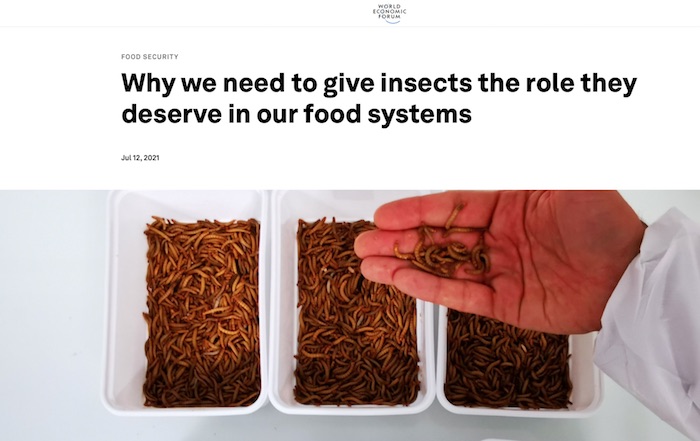
A few (very few) media outlets have picked up on this recent news release from the Canadian Taxpayers Federation regarding the human consumption of.. Bugs!
Yuck right? Well don’t panic. They’re not quite ready to swap your bowl of Count Chocula for cocoa-flavoured crickets just yet. However it does appear the Liberal government is hoping to put bugs on your menu. The article from the CTF is included below so I urge you to read on because it’s really interesting (and for those with a queasy stomach, just a tad disturbing).
But before you do that, a couple of observations.
First. This is NOT another win for the annoying conspiracy theory people. Sure they may have been spouting off about forcing us to eat bugs, but that doesn’t make this a classic conspiracy theory.
When it comes to conspiracy theories, most of us have always concluded there are just two types of people. There are the KOOKS. And then there are the people who do their best to avoid the kooks. Let’s call the first group the Flat Earthers, and the second group, Everyone Else (or the Rest of Us if you please).
Flat Earthers use evidence no one can verify to draw ridiculous conclusions and make strange accusations. Governments insisting we eat bugs may sound like a ridiculous conclusion formed by evidence no one can verify, but it turns out this is not the case at all.
Why is it that “The Liberal Government Wants Us To Eat Bugs” is not a ‘classic’ conspiracy theory?
Well it’s because of the words ‘conspiracy’ and ‘theory’. They just don’t apply.
The Oxford Dictionary defines conspiracy as “a secret plan by a group of people to do something harmful or illegal.” For one thing there’s nothing illegal about adding bugs to our diet. We’ve never had to make a law about it. Politicians like getting elected, and so it never occurred to them to force bugs onto our plates. Sure you’ll see them flipping pancakes and picking hot dogs off a bbq, but that’s about as ‘harmful’ as they’re willing to get. So there’s nothing illegal and nothing harmful going on. That leaves the part about being a secret.
To prove this isn’t a secret I’m afraid I’m going to have to put 2 and 2 together because we have to talk about the World Economic Forum. They might not be shouting it from the mountaintops, but the World Economic Forum isn’t hiding the fact they’d like us to replace meat protein with bugs. It’s only a secret if you’ve never taken the time to read “Why we need to give insects the role they deserve in our food systems“, or “5 reasons why eating insects could reduce climate change“.
You might think our trusted sources of information would look into this because food is something their readers tend to eat almost every day. Sometimes more than once. They might not even have to go to Davos to check it out. News reporters bump into Deputy PM Chrystia Freeland in the hallways on Parliament Hill all the time. Chrystia Freeland is on the World Economic Forum Board of Trustees If you click the link you can see her there, third person down on the right. If Deputy PM Freeland doesn’t know where to find these articles on the WEF website, as a Board of Trustee member she’ll know who to ask. So this certainly isn’t illegal or particularly harmful, and it’s only a secret to those who don’t read these things or have these things read to them by the information sources we’ve always trusted. The Liberal government might not talk about sharing goals with the WEF every day, but when Canada’s Deputy PM is on the WEF’s Board of Trustees let’s just say it would be odd to think they’re at odds.
The other word in play here is “theory”. When it comes to “conspiracy theory”, the word theory means “theoretical”, as in a theory, but not really happening. Again with the Oxford, second meaning applies here, “that could possibly exist, happen or be true, although this is unlikely”.
One could make a weak argument that Canada’s Deputy PM only goes to Davos to exchange stories with the rich and famous about how ridiculously hard it is to drive the speed limit in Alberta. One ‘theory’ is that she had to make it all the way back to Ottawa in an EV before it got cold. Regardless. Canada’s Deputy PM is a member of the WEF Board of Trustees. So although it could be a coincidence, it is not a theory that the federal government is funding bug – food research. As you’ll see below, the liberals are paying companies to ” promote the consumption of “roasted crickets” or “cricket powder” mixed-in with your morning bowl of cereal. ”
The fact the WEF has been talking about this for years now, the fact our Deputy Prime Minister is on the WEF Board of Trustees, and the fact the federal government is now funding research meant to change Canadians from people who stomp on bugs into people who chomp on bugs.. Well that pretty much takes the theoretical part right out of it.
Now that you’re hungry for more, here is the news release from a new trusted information source, the CTF.
By Ryan Thorpe of the Canadian Taxpayers Federation
Taste the crunch: cricket corporate welfare cost $420K

Bon apétit.
The federal government spent $420,023 since 2018 subsidizing companies that turn crickets into human food.
“Canadians are struggling as inflation pushes up grocery bills, but subsidizing snacks made out of bugs doesn’t sound like the right solution for taxpayers,” said Franco Terrazzano, CTF Federal Director. “If Prime Minister Justin Trudeau wants to take a bite out of crunchy crickets, he can do it without taking a bite out of taxpayers’ wallets.”
The Canadian Taxpayers Federation gathered the list of cricket corporate welfare deals by reviewing the federal government’s proactive disclosure of grants and contributions.
On two separate occasions, the feds cut cheques to a Montreal-based company called NAAK Inc., for a combined cost to taxpayers of $171,695.
The co-founders of NAAK were “introduced … to the benefits of adding insects to (their) diet” by a friend and describe their mission as “democratizing insect consumption.”
NAAK specializes in “cricket energy bars,” but a portion of its corporate welfare money was earmarked for developing other cricket products, including “steaks, sausages and falafels.”
NAAK is one of five companies producing crickets for human consumption that have received corporate welfare deals from the feds in recent years.
Table: Corporate welfare deals, 2018-2022
|
Company |
Number of subsidies |
Total cost of subsidies |
|
NAAK Inc. |
2 |
$171,695 |
|
Entologik Inc. |
2 |
$88,979 |
|
Prairie Cricket Farms |
2 |
$78,349 |
|
Gaia Protein |
1 |
$42,000 |
|
Casa Bonita Foods |
1 |
$39,000 |
Casa Bonita Foods wants to “manufacture high protein snacks made with cricket flour,” while Prairie Cricket Farms promotes the consumption of “roasted crickets” or “cricket powder” mixed-in with your morning bowl of cereal.
The founder of Entologik claims insects are the “protein of the future” and wants to grow the company into “the largest producers and processor of edible insects in Canada.”
“The feds are having their ‘let them eat crickets’ moment,” Terrazzano said. “If someone can sell crickets as food, we wish them the best of luck, but taxpayers shouldn’t be paying for it.”
An additional $8.7 million in subsidies went to Aspire Food Group, which operates a cricket processing plant in London, Ont. In total, the company received four separate handouts.
While the company is primarily geared toward pet food production, its owner said about 10 per cent of its business uses crickets for human food.
Daily Caller
Former FBI Asst Director Warns Terrorists Are ‘Well Embedded’ In US, Says Alert Should Be ‘Higher’
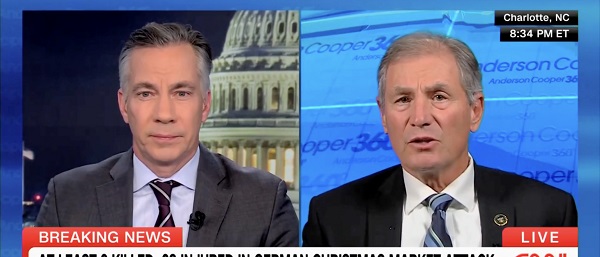
Chris Swecker on “Anderson Cooper 360” discussing terror threat

From the Daily Caller News Foundation
By Hailey Gomez
Former FBI Assistant Director Chris Swecker warned Friday on CNN that terrorists are “well embedded” within the United States, stating the threat level should be “higher” following an attack in Germany.
A 50-year-old Saudi doctor allegedly drove his car into a crowded Christmas market in Magdeburg, Germany on Friday leaving at least two people dead and nearly 70 injured so far. On “Anderson Cooper 360,” Swecker was asked if he believes there is a potential “threat” to the U.S. as concerns have risen since the “fall of Afghanistan.”
“I think so,” Swecker said. “I mean, we’ve heard FBI Director Chris Wray talk about this in conjunction with the relative ease of getting across the southern border. And, you know, there’s no question that terrorists have come across that border, whether they’re lone terrorists or terrorist cells. And they’re well embedded inside this country.”
WATCH:
“I’ve worked terrorist cases. Hezbollah has always had a presence here. They raise funds here, and they can always be called into action as an active terrorist cell,” Swecker added. “So I think the alert here, especially around Christmas time, is elevated. It probably ought to be higher than what it is right now, because I mentioned that complacency earlier. And I fear that complacency as someone who has a background in this field.”
Concerns over the Biden-Harris administration’s handling of the U.S. southern border have raised questions over the vetting process of illegal immigrants entering the country.
On Tuesday United States Border Patrol (USPB) Chief Jason Owens announced in a social post that an unidentified South African national who was “suspected of terror” was arrested in Brooklyn, N.Y. The illegal immigrant had originally been detained in Texas for criminal trespassing but was released due to the “information available at the time.”
In August an estimated 99 individuals on the U.S. terrorist watch list had been released into the country after crossing through the southern border, according to a congressional report. The report found that between fiscal years 2021 and 2023 USBP agents encountered more than 250 illegal migrants on the terrorist watchlist, with nearly 100 of those individuals being later released into the U.S. by the Department of Homeland Security.
Alberta
Ford and Trudeau are playing checkers. Trump and Smith are playing chess
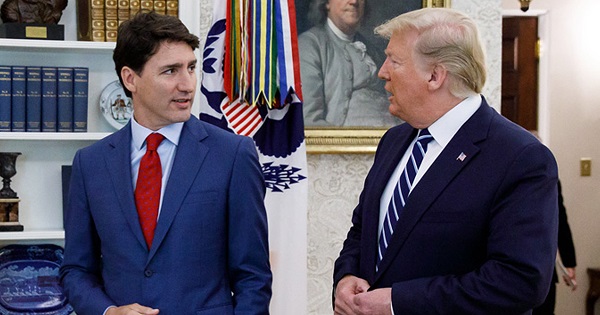
By Dan McTeague
Ford’s calls for national unity – “We need to stand united as Canadians!” – in context feels like an endorsement of fellow Electric Vehicle fanatic Trudeau. And you do wonder if that issue has something to do with it. After all, the two have worked together to pump billions in taxpayer dollars into the EV industry.
There’s no doubt about it: Donald Trump’s threat of a blanket 25% tariff on Canadian goods (to be established if the Canadian government fails to take sufficient action to combat drug trafficking and illegal crossings over our southern border) would be catastrophic for our nation’s economy. More than $3 billion in goods move between the U.S. and Canada on a daily basis. If enacted, the Trump tariff would likely result in a full-blown recession.
It falls upon Canada’s leaders to prevent that from happening. That’s why Justin Trudeau flew to Florida two weeks ago to point out to the president-elect that the trade relationship between our countries is mutually beneficial.
This is true, but Trudeau isn’t the best person to make that case to Trump, since he has been trashing the once and future president, and his supporters, both in public and private, for years. He did so again at an appearance just the other day, in which he implied that American voters were sexist for once again failing to elect the nation’s first female president, and said that Trump’s election amounted to an assault on women’s rights.
Consequently, the meeting with Trump didn’t go well.
But Trudeau isn’t Canada’s only politician, and in recent days we’ve seen some contrasting approaches to this serious matter from our provincial leaders.
First up was Doug Ford, who followed up a phone call with Trudeau earlier this week by saying that Canadians have to prepare for a trade war. “Folks, this is coming, it’s not ‘if,’ it is — it’s coming… and we need to be prepared.”
Ford said that he’s working with Liberal Finance Minister Chrystia Freeland to put together a retaliatory tariff list. Spokesmen for his government floated the idea of banning the LCBO from buying American alcohol, and restricting the export of critical minerals needed for electric vehicle batteries (I’m sure Trump is terrified about that last one).
But Ford’s most dramatic threat was his announcement that Ontario is prepared to shut down energy exports to the U.S., specifically to Michigan, New York, Wisconsin, and Minnesota, if Trump follows through with his plan. “We’re sending a message to the U.S. You come and attack Ontario, you attack the livelihoods of Ontario and Canadians, we’re going to use every tool in our toolbox to defend Ontarians and Canadians across the border,” Ford said.
Now, unfortunately, all of this chest-thumping rings hollow. Ontario does almost $500 billion per year in trade with the U.S., and the province’s supply chains are highly integrated with America’s. The idea of just cutting off the power, as if you could just flip a switch, is actually impossible. It’s a bluff, and Trump has already called him on it. When told about Ford’s threat by a reporter this week, Trump replied “That’s okay if he does that. That’s fine.”
And Ford’s calls for national unity – “We need to stand united as Canadians!” – in context feels like an endorsement of fellow Electric Vehicle fanatic Trudeau. And you do wonder if that issue has something to do with it. After all, the two have worked together to pump billions in taxpayer dollars into the EV industry. Just over the past year Ford and Trudeau have been seen side by side announcing their $5 billion commitment to Honda, or their $28.2 billion in subsidies for new Stellantis and Volkswagen electric vehicle battery plants.
Their assumption was that the U.S. would be a major market for Canadian EVs. Remember that “vehicles are the second largest Canadian export by value, at $51 billion in 2023 of which 93% was exported to the U.S.,”according to the Canadian Vehicle Manufacturers Association, and “Auto is Ontario’s top export at 28.9% of all exports (2023).”
But Trump ran on abolishing the Biden administration’s de facto EV mandate. Now that he’s back in the White House, the market for those EVs that Trudeau and Ford invested in so heavily is going to be much softer. Perhaps they’d like to be able to blame Trump’s tariffs for the coming downturn rather than their own misjudgment.
In any event, Ford’s tactic stands in stark contrast to the response from Alberta, Canada’s true energy superpower. Premier Danielle Smith made it clear that her province “will not support cutting off our Alberta energy exports to the U.S., nor will we support a tariff war with our largest trading partner and closest ally.”
Smith spoke about this topic at length at an event announcing a new $29-million border patrol team charged with combatting drug trafficking, at which said that Trudeau’s criticisms of the president-elect were, “not helpful.” Her deputy premier Mike Ellis was quoted as saying, “The concerns that president-elect Trump has expressed regarding fentanyl are, quite frankly, the same concerns that I and the premier have had.” Smith and Ellis also criticized Ottawa’s progressively lenient approach to drug crimes.
(For what it’s worth, a recent Léger poll found that “Just 29 per cent of [Canadians] believe Trump’s concerns about illegal immigration and drug trafficking from Canada to the U.S. are unwarranted.” Perhaps that’s why some recent polls have found that Trudeau is currently less popular in Canada than Trump at the moment.)
Smith said that Trudeau’s criticisms of the president-elect were, “not helpful.” And on X/Twitter she said, “Now is the time to… reach out to our friends and allies in the U.S. to remind them just how much Americans and Canadians mutually benefit from our trade relationship – and what we can do to grow that partnership further,” adding, “Tariffs just hurt Americans and Canadians on both sides of the border. Let’s make sure they don’t happen.”
This is exactly the right approach. Smith knows there is a lot at stake in this fight, and is not willing to step into the ring in a fight that Canada simply can’t win, and will cause a great deal of hardship for all involved along the way.
While Trudeau indulges in virtue signaling and Ford in sabre rattling, Danielle Smith is engaging in true statesmanship. That’s something that is in short supply in our country these days.
As I’ve written before, Trump is playing chess while Justin Trudeau and Doug Ford are playing checkers. They should take note of Smith’s strategy. Honey will attract more than vinegar, and if the long history of our two countries tell us anything, it’s that diplomacy is more effective than idle threats.
Dan McTeague is President of Canadians for Affordable Energy.
-
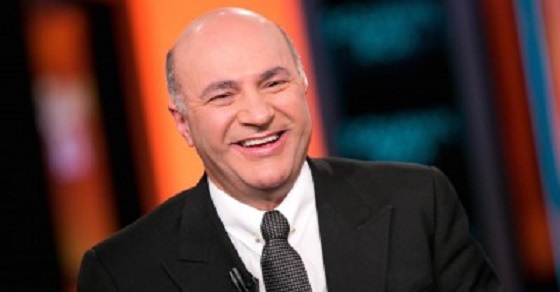
 Alberta1 day ago
Alberta1 day agoProposed $70 billion AI data centre in MD of Greenview could launch an incredible new chapter for western Canadian energy
-
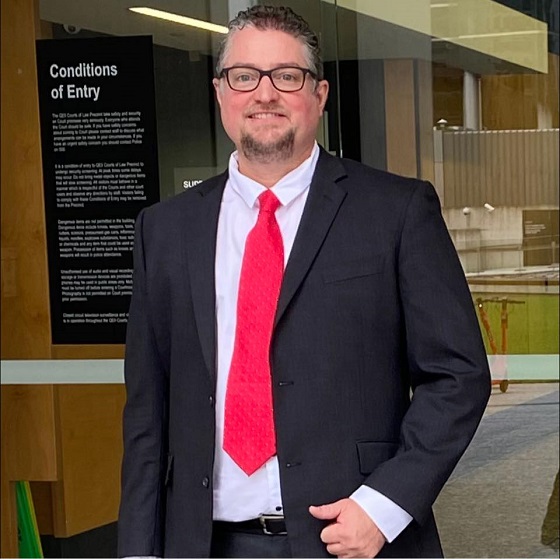
 COVID-192 days ago
COVID-192 days agoAustralian doctor who criticized COVID jabs has his suspension reversed
-

 Business2 days ago
Business2 days agoMassive growth in federal workforce contributes to Ottawa’s red ink
-

 Alberta20 hours ago
Alberta20 hours agoYour towing rights! AMA unveils measures to help fight predatory towing
-
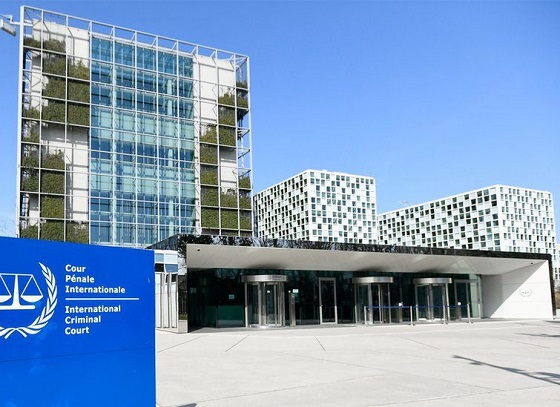
 Frontier Centre for Public Policy2 days ago
Frontier Centre for Public Policy2 days agoFalse Claims, Real Consequences: The ICC Referrals That Damaged Canada’s Reputation
-
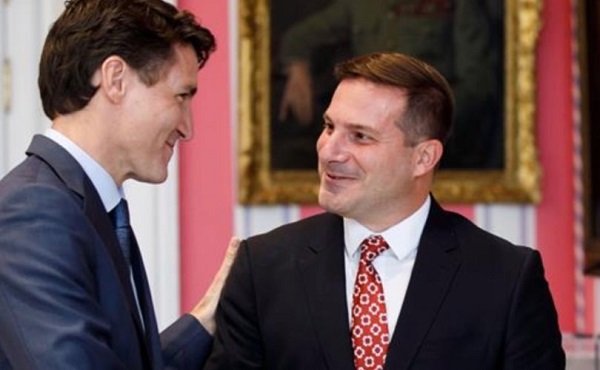
 COVID-192 days ago
COVID-192 days agoFormer Trudeau minister faces censure for ‘deliberately lying’ about Emergencies Act invocation
-

 National2 days ago
National2 days agoWhen’s the election? Singh finally commits. Poilievre asks Governor General to step in
-
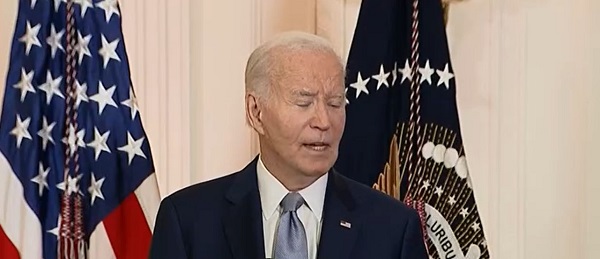
 Daily Caller2 days ago
Daily Caller2 days agoParty Leaders Exposed For ‘Lying’ About Biden Health





